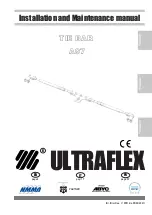
VT47S
– User Manual
Page 10/41
6. SERVICE PROCEDURE
Follow this TPMS service procedure each time before and after servicing tires/wheels.
6.1. T
EST SENSORS
Following the instructions in the CHECK TPMS menu of your TPMS TOOL. Trigger each of
the vehicle’s sensors, to ensure they work properly.
This procedure allows you to quickly identify damaged or defective sensors, as some
vehicles do not report a bad sensor condition on the vehicle dashboard until after more than
20 minutes.
Testing the sensors before any service also eliminates the liability associated with replacing
previously damaged or defective sensors.
Note: If the sensors do not respond to trigger, please refer to the Troubleshooting section of
this guide.
6.2. R
EPLACE SENSORS
Faulty sensors must be replaced to allow the vehicle’s TPM system to work properly. Use
the SERVICE SENSOR of your TPMS TOOL to find the original equipment replacement
sensor or a universal aftermarket sensor.
Universal sensors must be programmed before use. Follow the instructions in PROGRAM
SENSOR to create or clone universal sensors.
6.3. R
ELEARN THE
TPM
SYSTEM
Once a replacement sensor has been installed, the new sensor ID must be registered by
TPMS ECU, to allow communication between the sensor and the vehicle.
The SERVICE TPMS menu indicates which relearn method is required: MANUAL
RELEARN, OBD RELEARN or AUTO RELEARN. Follow the on-screen instructions.
When the relearn procedure requires to trigger the sensors, always begin with the Left Front
(LF) wheel sensor. Proceed to the next wheel sensor in clockwise rotation, until ALL sensors
have been retrained. Example : LF (Left Front), RF (Right Front), RR (Right Rear), LR (Left
Rear). If the spare wheel is TPMS equipped, this must be trigger at last.
Some vehicles provide an audible beep confirming that the sensor ID has been learned by
the TPMS ECU.
For vehicles that do not require retraining, it is recommended to trigger each wheel sensor,
one final time, to ensure they are working properly prior to releasing the vehicle to the
customer.











































